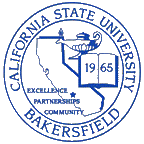Office: Sci III 338, 654-3180
Office Hours: M 12:45 - 1:45pm and WF 12:45 - 2:45pm (or by appointment)
Email: melissa@cs.csub.edu
Course Time: 5:50 - 8:45pm
Course Dates: Monday January 7 and Wednesday January 9
CMPS 150 ONLY meets for the first week of the quarter.
Course Locations:
Section 1: Sci III 240
Section 2: Sci III 324NOTE: This is a large class, so if all the computers are taken, please still come in to the room. You may also opt to complete this lab on your own time instead of coming to class. Read below for details.
Course websites are http://www.cs.csubak.edu/cs150/ for assignments and this page for the syllabus.
Tutors: Department Tutoring Center Schedule
This course is a corequisite for CMPS 221. There are no prerequisites.
CMPS 150 introduces you to the basic commands you will need to know to use the Computer Science department servers for your programming courses. Even non-majors who take CMPS 221 should take this course to familiarize yourself with the command-line environment used for CMPS 221.
Computer Science majors are required to take either CMPS 150 or CMPS 215. Computer Science majors are STRONGLY encouraged to take CMPS 215, "Unix Programming Environment". CMPS 215 is a 3 unit, 10 week course offered every Fall Quarter. CMPS 215 goes beyond the scope of this course to teach you how to really get the most out of the Computer Science department servers for programmming. CMPS 215 can also be used for elective credit for the CIS track and is the prerequisite for CMPS 216 "Unix System Administration" which is another CIS track elective.
You should attend the first session of the course to pick up your account information sheet, which is needed to complete the course. If you cannot attend the first session, contact the instructor during office hours or Steve Garcia (the department system administrator in Sci III 332) between 3:00 - 5:00pm on the first day of class for your account sheet.
If you have previously had an account on the Computer Science servers but cannot remember your password, see Steve Garcia or the instructor for a new password.
CMPS 150 is a credit/no credit class. You must complete the assignments to receive credit, either during the course meeting times or at another time with the tutors. If you do not attend the course meeting times, it is your responsibility to meet with the tutors and have your assignments checked.
To receive credit, you MUST have completed the required labs (either in class or with the tutors) by the last day of classes.
The optional assignment (Lab 3) is STRONGLY recommended for Computer Science and Computer Engineering majors. Some of the syntax may be required in other CEE/CS courses, such as how to make a zip file or tarball. It is easier to learn this syntax with help (the instructor and student assistants can help you with the optional lab) than on your own.
